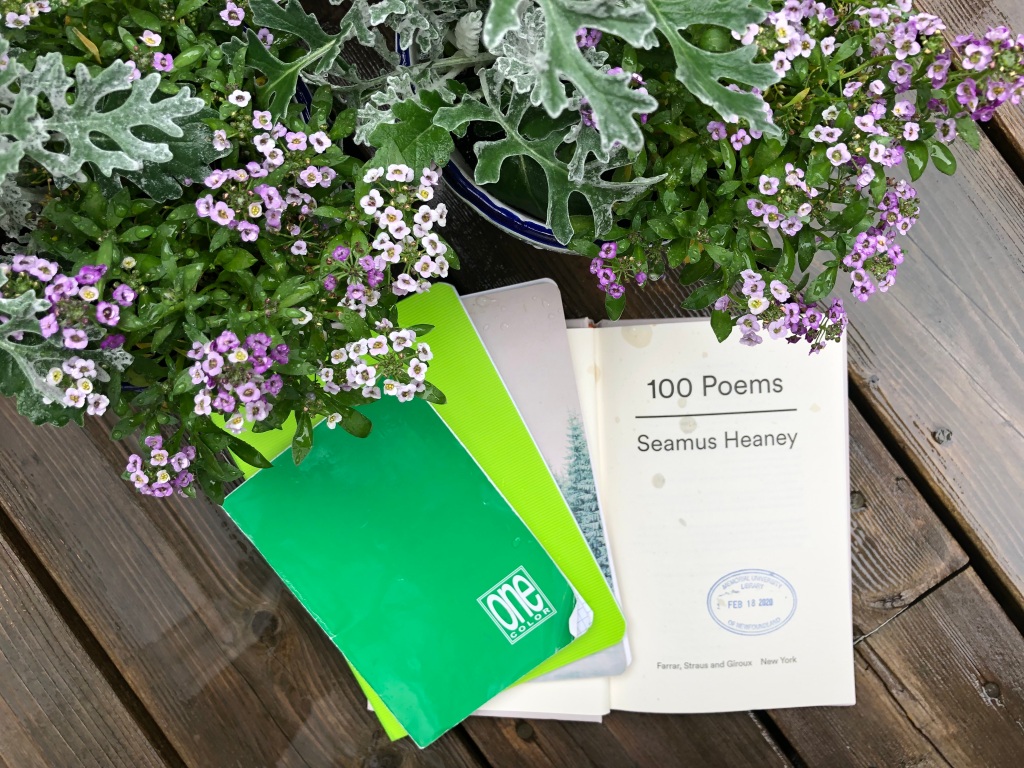
The most meaningful reading that I did during my sabbatical year was Seamus Heaney’s collection, 100 Poems.
I didn’t set out to read poetry during my sabbatical. This collection, (or any other collection of poetry for that matter), wasn’t included on the ambitious list of tasks I aimed to complete. But, Jackie Lyman, a Dublin-based librarian and someone who’s has helped me with research previously, urged me to take up the challenge: 100 poems by Seamus Heaney.
Surely, I could spread 100 poems out over 365 days?
When I began reading, I knew three poems by Seamus Heaney. They are probably the same three poems that many people know. I knew very little about Heaney himself. But, by the end of the year and the end of the collection, I felt like I knew him better. His poetry offered glimpses into the everyday, and sometimes, mundane activities of his life, wandering in gardens, embarking on ferry crossings and on bus journeys, and listening to music. I imagined Heaney, in crowded rooms, sitting quietly, composing lines of poetry in his head.
First I read the poems aloud. Then I challenged myself to write down what I thought I understood about them. (Full disclosure: I’m still skimming the surfaces of his mythological references). I jotted down my thoughts in notebooks. By the end of the year, three notebooks sat beside my volume of Heaney’s 100 Poems.
All of them, green notebooks.
“Be advised my passport’s green./
No glass of ours was ever raised to toast the Queen.”
The fact that all of the notebooks (my passports to poetry) are green was a happy coincidence.
Reading Heaney’s poems brought many unexpected surprises. During a year of uncertainty and lockdowns, it granted me permission to wander through the townlands where I’d spent two previous sabbatical years, and where I’d have otherwise spent a considerable amount of time during this sabbatical. It brought back memories of places, feelings, and sights – the shadow of the sun across the fields, bold wallsteads, and bouncing lambs. But Heaney’s poems don’t confine themselves to tourist-brochure depictions and there is also fear, unnecessary deaths, body bags, and retribution punishments.
“The stones of silence.”
Heaney’s deep immersion in the natural world and its hedges and harvest bows were a relief on days when even venturing outdoors felt risky. And the poems came with their own place-specific vocabulary to which dictionaries just don’t do justice.
Heaney’s poems are full of people. I met many of them during a time when I wasn’t meeting anyone else. He introduced his family – his mother, father, brothers, wife, and children – along with a rich network of other poets and artists. As the pandemic world became uncomfortably small, I tagged along (in the literary sense) with Heaney and his family on picnics and night drives. I accompanied them on excursions to Donegal, to the Blasket Islands, and to Wicklow and on holidays, (many of them working holidays, I’m sure), to Spain, England, Greece, France and the United States.
Poems written after Heaney’s stroke, (this particular collection was assembled posthumously by his family), seemed to speak directly to the fragility of the newly afflicted pandemic world.
The closest I got to Seamus Heaney’s legacy was by way of a virtual conference that was to have been held in Derry, Northern Ireland, about an hour away from Heaney’s birthplace. It’s now the site of Seamus Heaney’s HomePlace and it has been added to my list of places to visit when travel becomes safe again.
I was beyond excited when Mary Heaney, Seamus Heaney’s widow, welcomed the conference attendees virtually. And I have the screenshot to prove it.
Amidst all of the other stressors over this past year, I enjoyed the quiet early morning contemplation of a new poem. I was reminded just how broad scholarly work should be. And I was reminded of the benefits, which are so easily forgotten, of stretching across assumptions about disciplinary boundaries and their specific genres.
What I acquired was far more than an appreciation for Heaney’s poetry. I met new people and travelled to new places. My world felt larger at a time when it was being made smaller.
I know with certainty which collection of Heaney’s poetry I’ll be reading next.